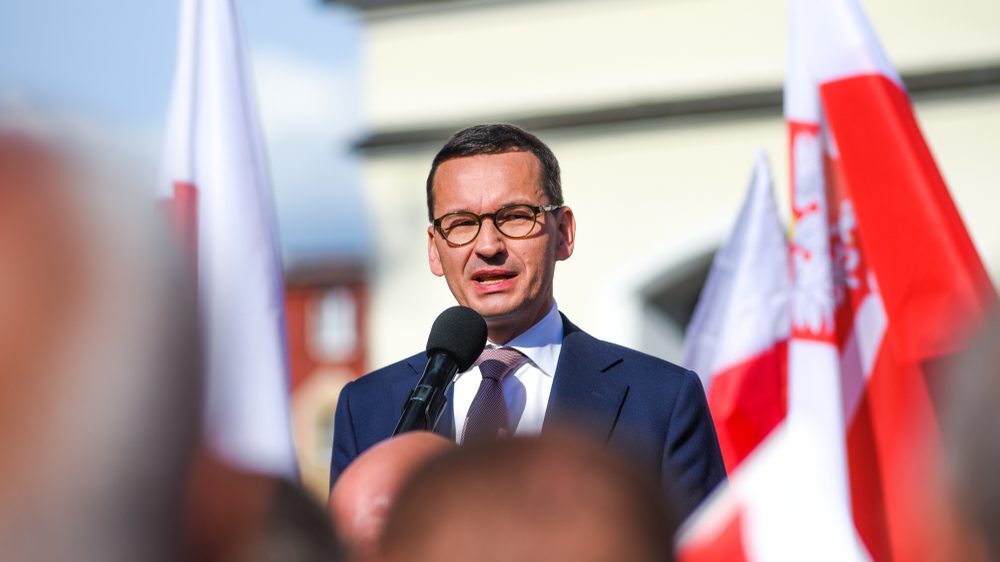
Polish politics is heating up ahead of October’s national election as the country’s conservative Prime Minister Mateusz Morawiecki denounced EU interference as he challenged Manfred Weber, the leader of the European Parliament’s largest faction, the European People’s Party (EPP), to a one-on-one TV debate.
Poland’s governing PiS party is in a tight battle to maintain power against stiff opposition from the left and the right as it fends off ‘rule of law’ legal claims from the European Commission designed to subvert Warsaw’s EU-critical policies around migration and social policy.
Both the EU and the centrist EPP are rowing hard behind liberal opposition leader Donald Tusk, who attracted crowds of hundreds of thousands on the streets of central Warsaw last month in what is seen as an effort to topple Poland’s conservative government.
I would kindly like to invite you @ManfredWeber to join me for a debate – to be scheduled for the 2nd October 2023. pic.twitter.com/JvApc513ml
— Mateusz Morawiecki (@MorawieckiM) August 8, 2023
In a feisty video posted from his official Twitter account Tuesday evening, Morawiecki threw down the gauntlet to the EPP’s Weber directly, bringing up the 51-year-old Christian Democratic politician’s nationality in the debate challenge.
“He called us his enemies … enough of that. If the Germans openly admit that they will interfere in the elections in Poland, let them stand with an open visor,” Morawiecki declared as he challenged Weber to a debate two weeks before the Polish elections scheduled for October 15th.
Morawiecki made specific reference to Weber’s weekend comments on German TV, where he elucidated on the need for PiS and other populist parties such as Germany’s AfD and France’s RN “to be defeated” to protect what he called “European values.”
Weber, whom many regard as a potential replacement for the EU Commission president after 2024, has been vocal about criticising PiS in the rule of law dispute as his EPP faction endorsed Donald Tusk and his Civic Platform party.
The Polish prime minister’s video calling out Weber and denouncing EU meddling could complicate previous outreach conducted by Weber personally to PiS ally Giorgia Meloni amid predictions of a coalition of the centre and conservative right after next year’s European elections.
On the campaign trail, PiS has strategically toned down its uncompromising rhetoric on Ukraine, facing a backlash by farmers against Ukrainian grain flooding the country and lowering prices. Despite the emergence of a NATO-critical right-wing challenger in the form of the nationalist Konfederacja, PiS is the frontrunner in opinion polls with a comfortable but not unassailable six-point lead.
PiS, which has governed Poland since 2015, has been accused of weaponising a new investigatory commission to prevent Russian influence from undermining Tusk and the Civic Platform, with Western NGOs criticising the loose phrasing of the commission as well as the fact it is directly subordinate to the Polish Parliament, currently controlled by PiS.
Amid signs of a growth in support for the left and right-wing opposition, Morawiecki appeared on Polish TV last week, promising to take a harsher line on a developing border crisis with Belarus as Belarussian helicopters were reported to have crossed into Polish airspace.
Polish politics traditionally rely on complex coalition arrangements. University of Sussex Professor of Politics Aleks Szczerbiak predicts that PiS will remain in power, with the support of the more right-wing Konfederacja, as the most likely outcome of the October election.
A relatively new political party formed out of an electoral alliance between smaller right-wing factions, Konfederacja has garnered prominence among young Polish men as it overtook the socialists to take third place in polls, with the party’s NATO-sceptic and libertarian economic policies eating into core PiS voting demographics.
Similar to attacks on the Fidesz government in Hungary, attempts by the EU and outside NGOs to undermine non-compliant conservative governments have aggravated relations as the European Commission has stalled some EU funds from reaching Poland.
